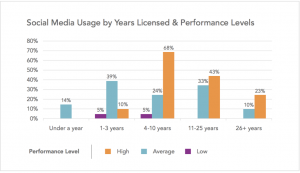
How Today’s Housing Market Has Changed Things for New Real Estate Agents- Guest Post
Ask any experienced agent and they’ll report that the real estate industry is currently in a period of evolution and change. Although some have worried that the role of real estate agents will become obsolete in the next decade, many are more adamant that the field is simply undergoing changes that agents will need to adapt to quickly.
This poses an especially tricky task for new real estate agents just entering the industry. They’re beginning their careers in a state of flux, which makes learning the ropes and problem-solving tactics quite challenging. Let’s talk about some of the biggest changes they’re facing and what they mean.
1. Technology Is a Must-Have
Think about this: have you heard of anyone buying or selling their home in recent years who didn’t use technology on at least some level? New software and applications have turned the world of real estate upside down, and agents need to catch on if they’re going to keep up.
For example, let’s say you’re a Seattle-based real estate agent who’s looking for nearby clients, as well as Seattle property management companies to work with. How will you make those connections? Certainly not by strolling around the city streets or making phone calls to locals. Even bulletin boards and newspaper ads have become somewhat unnecessary in a world where digital advertisements and connections rule.

Source: Real Estate Express
As you can see from the graph above, the agents who are succeeding in today’s real estate industry understand that social media, apps, and mobile-friendly websites are the way to buyers’ and sellers’ hearts. In 2019, 52 percent of global internet traffic comes from mobile devices. If a new real estate agent wants to make themselves available to the public (and stay relevant), then optimizing for the future of technology is essential.
2. AI Is the New Competition
A recent study by Oxford on artificial intelligence made the claim that 97 to 99 percent of real estate agent jobs could be obsolete due to AI in the next decade or so. If that’s not enough to set newbie real estate agents quaking in their shoes, then what is?
Since it’s clear that artificial intelligence is the biggest competition for today’s real estate professionals, now is the time for incoming agents to determine what they can offer clients that websites and software solutions cannot. One of the biggest areas in which real estate agents can win against AI is in building long-term relationships.
Now, more than ever, it’s vital that new real estate agents highlight the importance of understanding their clients’ needs on a personal level. You want your clients to return to you when it’s time to move again or when they’re recommending a real estate agent to a friend. The only way you can earn their trust more than an artificially intelligent software program is to show them the things a computer can’t: empathy, deep understanding, friendliness, and a dedication to making them happy.
One thing new real estate agents should keep in mind is that although AI may be the competition, it’s not the enemy. In fact, real estate agents are better off using AI in some cases to improve their own business. For instance, fast-responding chatbots can be a huge assistance when it comes to dealing with clients who work odd hours or contact you constantly.
In the age of technology, people practically expect all businesses to rely on AI in at least some capacity. If new real estate agents ignore these opportunities due to a fear of becoming obsolete, it’s possible that their advantage over artificial intelligence will disappear quickly.
3. They Probably Won’t Work With Millennials
Recent reports have indicated that most millennials aren’t that interested in using a real estate agent, especially when it comes to selling their homes. As little as 35 percent are flat out choosing not to use a real estate agent. Why? To sum up their reasons, money.
Most millennials are avoiding real estate agents and companies because they want to save money. If they can figure out how to achieve the same results with cheaper (or even free) online services, they will. This comes as no surprise considering how much of the millennial generation is saddled with astronomical debt.
Knowing this, new real estate agents have some decisions to make. First of all, who will they target? Will they attempt to revolutionize real estate marketing strategies to appeal to millennials, or will they attempt to target buyers and sellers from older generations?
It’s all about knowing your client base and what they want from you. If new real estate agents are going to target millennials, they’ll need to be savvy about it. Otherwise, they might be better off sticking to age groups that are more familiar with real estate agents.
In Conclusion
Being an agent in the real estate industry right now isn’t easy. It’s all about learning what potential clients want and altering your techniques to fit modern-day expectations. Changes like the introduction of AI and social media advertising may be threatening, but when used correctly, they can be a tool for the growth of new, savvy real estate agents.
As a real estate agent who’s just now entering the game, ask yourself, “What can I do differently from past generations to keep this career living and breathing?” On some level, customers will always appreciate a smiling face with an abundance of knowledge and human emotion. However, it’s up to you to showcase these unique aspects while still combating AI competition and generational changes.
Author Bio:
Eric D. Davis is the Founder of Davis Property Management; we help property managers and potential tenants looking for Seattle Property Management and Maintenance services. We have been the front-runners in providing best-in-class property management services in the Puget Sound area.


Sorry, the comment form is closed at this time.